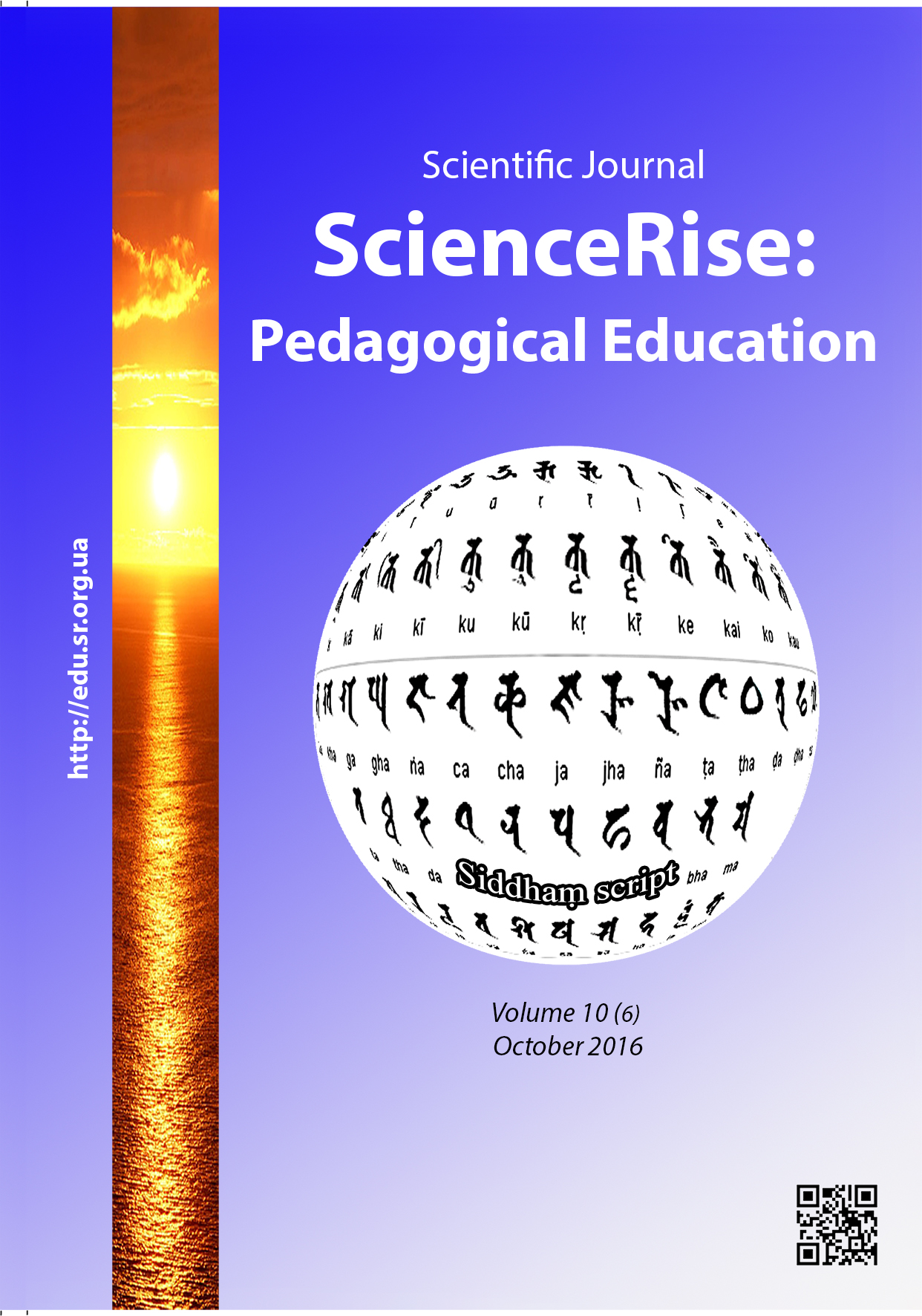Web-quest as a method of formation of the readiness for innovative activity in students at the higher school
DOI:
https://doi.org/10.15587/2519-4984.2016.81171Keywords:
e-means of study, web-quest, innovative activity, readiness for innovative activityAbstract
The meaning of web-quest as a mean of formation of the readiness for innovative activity of the future specialists at the higher educational institutions was elucidated in the article. The methodical recommendations as to the professional web-quest, directed on the formation of the readiness for innovative activity in future specialists were formulated.
The structure and main tasks at each stage of web-quest for the formation of the readiness for innovative activity on the topic “The way to innovative project creation” were offered. Such web-quest must take place in two stages. The first stage of web-quest is analytic one. The main task of this stage is a search and systematization of information as to elaboration of innovative projects. The second state of web-quest is projective. The main task of this stage is a planning and elaboration of innovative project.
The author also determines the advantages of introduction of web-quest into educational process: the raise of interest of the specialists in introduction of innovations in professional activity; development of creative thinking; formation of the value attitude to innovative activity; creation of favorable climate; release of future specialists from psychological barriers at communication
References
- Gajevs'kyj, V. L. Elektronni zasoby navchannja ta i'h vykorystannja. Available at: http://tmb.org.ua/new/index.php/i-i/4-/200-2012-12-09-19-38-06.html
- Koshechko, N. (2015). Innovacijni osvitni tehnologii' navchannja ta vykladannja u vyshhij shkoli. Visnyk Kyi'vs'kogo nacional'nogo universytetu imeni Tarasa Shevchenka. Pedagogika, 1, 35–38.
- Kademija, M. Ju. (2011). Vykorystannja Veb-kvestiv u procesi pidgotovky vchytelja tehnologij. Naukovi zapysky. Serija: Pedagogika, 3, 353–356.
- Kapunova, M. I. (2015). Uroven' sformirovannosti gotovnosti budushhih dizajnerov k innovacionnoj professional'noj dejatel'nosti v processe special'noj podgotovki. Molodoj uchenyj, 9, 1072–1075.
- Fomichjova, O. V. (2015). Struktura gotovnosti budushhih specialistov po tehnologijam jelektronnyh mul'timedijnyh izdanij k innovacionnoj professional'noj dejatel'nosti. Alma mater (Vestnik vysshej shkoly), 10, 114–117.
- Ogijenko, O. I. (2013). Formuvannja gotovnosti do innovacijnoi' dijal'nosti jak vazhlyva skladova profesijnoi' pidgotovky majbutn'ogo vchytelja. Pedagogichni nauky: teorija, istorija, innovacijni tehnologii', 7 (33), 154–162.
- Shamatonova, G. L. (2010). Veb-kvest kak interaktivnaja metodika obuchenija budushhih specialistov po social'noj rabote. SOCIOPROSTІR, 1, 234–236. Available at: http://www.sociology.kharkov.ua/images/socioprostir/magazine/1_2010/4_5_1.pdf
- Kononec, N. (2012). Tehnologіja veb-kvest u kontekstі resursno-orіentovanogo navchannja studentіv. Vitoki pedagogіchnoї majsternostі. Serіja: Pedagogіchnі nauki, 10, 138–143. Available at: http://nbuv.gov.ua/UJRN/vpm_2012_10_32
- Gapejeva, O. L. (2010). WEB-QUEST tehnologija u navchanni studentiv za programmoju pidgotovky oficeriv zapasu. Naukovyj visnyk NLTU Ukrai'ny, 21.1, 335–340.
- Gurevych, R. S., Kademija, M. Ju., Shestopaljuk, O. V. (2012). Veb-kvest u navchanni: putivnyk. Vinnycja: RVV VDPU imeni Myhajla Kocjubyns'kogo, 128.
Downloads
Published
How to Cite
Issue
Section
License
Copyright (c) 2016 Ольга Володимирівна Фомічова

This work is licensed under a Creative Commons Attribution 4.0 International License.
Our journal abides by the Creative Commons CC BY copyright rights and permissions for open access journals.
Authors, who are published in this journal, agree to the following conditions:
1. The authors reserve the right to authorship of the work and pass the first publication right of this work to the journal under the terms of a Creative Commons CC BY, which allows others to freely distribute the published research with the obligatory reference to the authors of the original work and the first publication of the work in this journal.
2. The authors have the right to conclude separate supplement agreements that relate to non-exclusive work distribution in the form in which it has been published by the journal (for example, to upload the work to the online storage of the journal or publish it as part of a monograph), provided that the reference to the first publication of the work in this journal is included.








